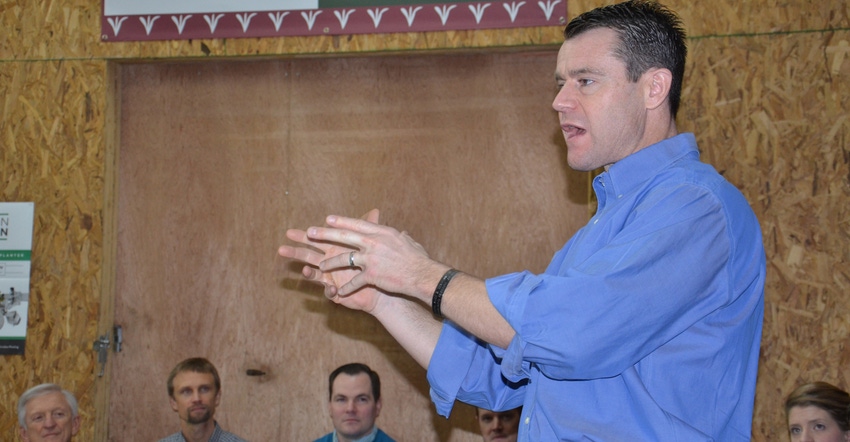
Tom and Karen McKinney invited a few folks to their Tipton, Ind., farm on a rainy February day. The visitors included farmers, ag business leaders, a mayor, a state representative and high school students. The guest of honor, Sen. Todd Young, soon made it clear he was there to listen.
“I want to know what you’re thinking on the farm bill and other ag issues,” said Young, a Republican.
Surprisingly, the first issue was about guns and keeping schools safe. After a spirited discussion, the audience shifted to ag topics.
Key ag topics
Here’s a brief rundown of what Young heard during the roundtable session. Speakers aren’t identified. Often, more than one participant echoed similar concerns.
• Crop insurance. “The president’s budget would reduce the percentage of subsidy for crop insurance,” one farmer said. “Congress must know that crop insurance is extremely important for risk management. It’s working, and federal subsidies allow us to afford premiums.”
Young assured farmers that key members of Congress are aware of how important crop insurance is today. “Congress will make the final decisions on budgets,” Young said. “The president submits a budget, but it’s looked at more like his suggestions.
“One of my roles is to be an advocate for Indiana agriculture. I hear you loud and clear. Federal subsidies for crop insurance are extremely important and allow you to decide what level of risk you want to take.”
• Tax reform and Section 199A. This complicated issue concerns a financial incentive for farm cooperatives that was removed in the original tax reform proposal. To prevent a big hit on co-ops, Congress added language to help them in a different way. Inadvertently, however, many feel it now puts farmers who don’t deal with co-ops at a disadvantage. One key component is that the first 20% of grain sold to a co-op wouldn’t be taxed.
“If this stands, we will all be forming co-ops,” one person said. No one laughed. Instead, they nodded in agreement.
“We realize that this issue must be addressed,” Young said. “There are people working on it as we speak. We will come up with a solution that is fair.”
• Renewable fuels. “We don’t think we’re getting a fair shake on the renewable fuels mandate,” one farmer noted. “Modern cars can handle E-15 fuel, and we would sell more ethanol, but EPA rules are holding it back. They just need to let it happen.”
Young said sometimes not everyone in agriculture who speaks to him is on the same page. “On this one, livestock people get concerned if corn prices rise too high,” he explained. “We have to take everything into account.” He assured folks that this issue would get a hard and fair evaluation.
• National debt. “Does anyone even care about it anymore?” one person asked the senator. Again, no one laughed.
“Yes, we care,” Young responded. “The U.S. military had to be funded at proper levels, and it took a spending deal to accomplish it. Going forward, hopefully tax cuts will help the economy long term. We have people working hard to open up foreign markets, and that will help, too.”
About the Author(s)
You May Also Like




